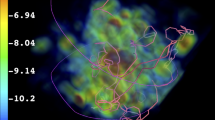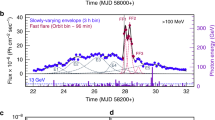Abstract
THE recent identification by W. Baade and R. Minkowski of the intense discrete radio source in Cygnus as being an emission from two colliding galaxies1 raises a number of interesting theoretical questions. In the first place, the only material likely to be seriously disturbed by such a collision is the diffuse interstellar material lying between the stars in these galaxies. Consequently, it would seem profitable to seek a process of generation of radio waves that takes place in extremely diffuse gas clouds. Secondly, processes of magnetic resonance requiring field intensities of many gauss, such as the Larmor precession, would seem to be excluded, since fields of this intensity could scarcely be maintained throughout regions of galactic dimensions.
This is a preview of subscription content, access via your institution
Access options
Subscribe to this journal
Receive 51 print issues and online access
$199.00 per year
only $3.90 per issue
Buy this article
- Purchase on Springer Link
- Instant access to full article PDF
Prices may be subject to local taxes which are calculated during checkout
Similar content being viewed by others
References
Baade, W., and Minkowski, R., Astrophys. J. (in the press).
Greenstein, J. L., and Minkowski, R., Astrophys. J. (in the press).
Author information
Authors and Affiliations
Rights and permissions
About this article
Cite this article
HOYLE, F. Cosmic Origin of Radiation at Radio Frequencies. Nature 172, 296–297 (1953). https://doi.org/10.1038/172296a0
Issue Date:
DOI: https://doi.org/10.1038/172296a0
This article is cited by
-
Generation of Radio Noise by Cosmic Sources
Nature (1954)
-
Generation of Radio Noise by Cosmic Sources
Nature (1954)
Comments
By submitting a comment you agree to abide by our Terms and Community Guidelines. If you find something abusive or that does not comply with our terms or guidelines please flag it as inappropriate.



